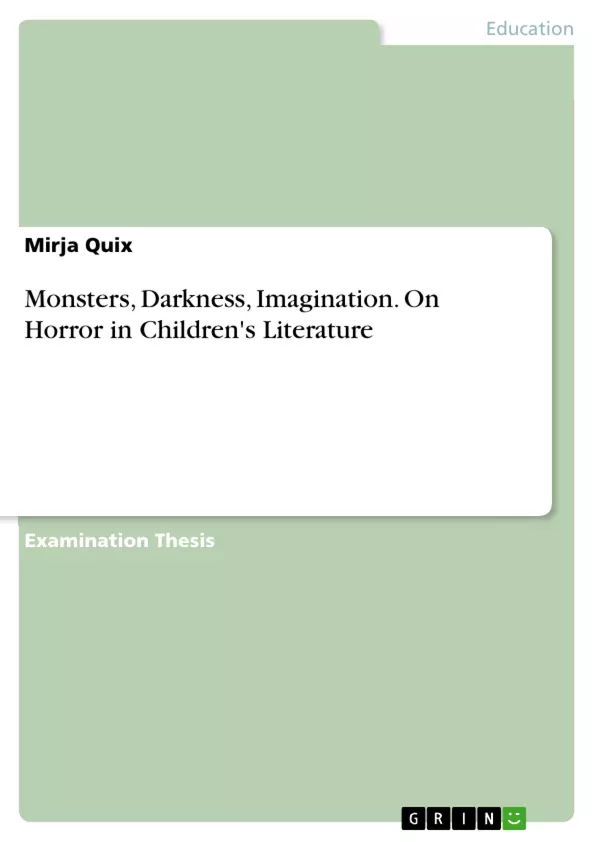
Monsters, Darkness, Imagination. On Horror in Children's Literature
Examensarbeit, 2016
70 Seiten, Note: 1,0
Leseprobe
Table of Contents
- Introduction
- Children's Literature
- History of Children's Literature
- Defining Children's Literature in Literary Studies
- Child Readers and Adult Writers
- Horror Literature
- The Gothic
- Children and Horror Literature
- Fairy Tales and Censorship
- Aspects of Horror in Children's Literature
- The Uncanny and the Unconscious
- Normality and Otherness
- Other Worlds and Parallel Universes
- Mothers and Other Wicked Women
- Animals
- Lurking Danger and Death
- Being Trapped, Being Lost and Being Small
- Being Devoured and Vanishing
- Being Left and Being Alone
- Monsters
- Illustrations
- Why should Children read Horrific Literature?
- Pleasure
- Humour
- Overcoming Fear
- Conclusion
- Sources
Objectives and Key Themes
This work explores the nature of horror elements in children's literature and their potential effects on young readers. It aims to explain why these elements are important for children's literature. The paper examines various aspects of children's literature, including its history, definition, and the relationship between child readers and adult writers. It also delves into the nature of horror literature and explores its presence in children's literature.
- The history and definition of children's literature
- The relationship between child readers and adult writers
- The nature of horror literature and its presence in children's literature
- The impact of horror elements on children's literature and their potential effects on young readers
- The reasons why horror elements should be included in children's literature
Chapter Summaries
The introduction presents various examples of horror elements in children's literature, highlighting the genre's versatility and the tension between the perceived innocence of childhood and the inclusion of scary elements. The chapter also introduces the paper's objectives and outlines its structure.
Chapter 2 discusses the challenges in defining children's literature, exploring different perspectives and the discrepancies between adult expectations and the actual needs of child readers. It provides a historical overview of the genre, tracing its development from the eighteenth century to the modern era.
Chapter 3 delves into the nature of horror literature, focusing on the Gothic genre and its relevance to children's literature. The chapter examines the inclusion of fairy tales in horror literature and discusses censorship efforts.
Chapter 4 examines various aspects of horror in children's literature, analyzing elements like child fears, danger, and monsters in selected books. It deconstructs how frightening elements are incorporated into children's literature and explores the positive effects of horror on young readers.
Keywords
Children's literature, horror literature, Gothic, fairy tales, censorship, child readers, adult writers, the uncanny, fear, monsters, imagination, pleasure, humour, overcoming fear, the history of children's literature, children and horror, aspects of horror in children's literature, illustrations, Why should children read horrific literature?
Frequently Asked Questions
Why should children read literature containing elements of horror?
Horror elements can help children overcome fears, provide pleasure through controlled excitement, and use humor to process scary concepts.
What are common horror elements found in children's books?
Common elements include the uncanny, monsters, wicked women (like stepmothers), lurking danger, and the fear of being lost or alone.
How does the relationship between adult writers and child readers affect the genre?
There is often a discrepancy between what adults think children should read (innocence) and what children actually need or enjoy (exploration of fear and darkness).
What role do fairy tales play in horror literature for children?
Fairy tales are foundational to the genre, often containing dark and grotesque elements that have historically faced censorship efforts by adults.
Which famous authors are used as examples in the study?
The work analyzes books by Lewis Carroll, J. M. Barrie, and Roald Dahl to show how frightening elements are incorporated into classic children's literature.
What is the "Uncanny" in children's literature?
The "Uncanny" refers to something that is simultaneously familiar yet strange or eerie, often tapping into a child's unconscious fears.
Details
- Titel
- Monsters, Darkness, Imagination. On Horror in Children's Literature
- Hochschule
- Universität zu Köln (Englisches Seminar)
- Note
- 1,0
- Autor
- Mirja Quix (Autor:in)
- Erscheinungsjahr
- 2016
- Seiten
- 70
- Katalognummer
- V428701
- ISBN (eBook)
- 9783668730847
- ISBN (Buch)
- 9783668730854
- Dateigröße
- 1004 KB
- Sprache
- Englisch
- Schlagworte
- monsters darkness imagination horror children literature
- Produktsicherheit
- GRIN Publishing GmbH
- Preis (Ebook)
- US$ 32,99
- Preis (Book)
- US$ 46,99
- Arbeit zitieren
- Mirja Quix (Autor:in), 2016, Monsters, Darkness, Imagination. On Horror in Children's Literature, München, Page::Imprint:: GRINVerlagOHG, https://www.diplomarbeiten24.de/document/428701
- Autor werden
- Ihre Optionen
- Vertriebskanäle
- Premium Services
- Autorenprofil
- Textarten und Formate
- Services für Verlage, Hochschulen, Unternehmen

- © GRIN Publishing GmbH.
- Alle Inhalte urheberrechtlich geschützt. Kopieren und verbreiten untersagt.
- info@grin.com
- AGB
- Open Publishing
Der GRIN Verlag hat sich seit 1998 auf die Veröffentlichung akademischer eBooks und Bücher spezialisiert. Der GRIN Verlag steht damit als erstes Unternehmen für User Generated Quality Content. Die Verlagsseiten GRIN.com, Hausarbeiten.de und Diplomarbeiten24 bieten für Hochschullehrer, Absolventen und Studenten die ideale Plattform, wissenschaftliche Texte wie Hausarbeiten, Referate, Bachelorarbeiten, Masterarbeiten, Diplomarbeiten, Dissertationen und wissenschaftliche Aufsätze einem breiten Publikum zu präsentieren.
Kostenfreie Veröffentlichung: Hausarbeit, Bachelorarbeit, Diplomarbeit, Dissertation, Masterarbeit, Interpretation oder Referat jetzt veröffentlichen!
- GRIN Verlag GmbH
-
- Nymphenburger Str. 86
- 80636
- Munich, Deutschland
- +49 89-550559-0
- +49 89-550559-10
- info@grin.com
-









